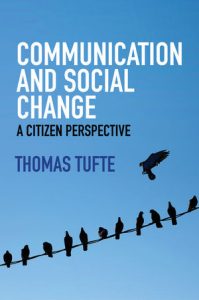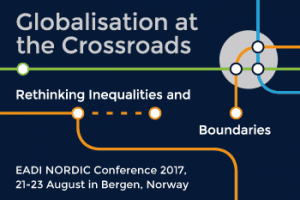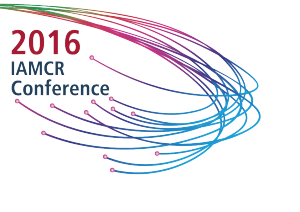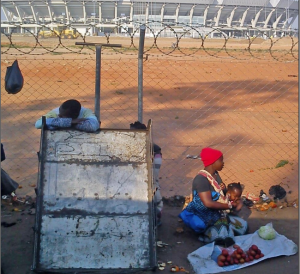Call for Abstracts: New Directions in Media, Communication and Sociology (NDiMS) Conference

PhD-students and early career researchers are invited to submit an abstract for the NDiMS 2017, taking place at the University of Leicester on July 3, 2017. This conference is a follow-up to the very successful New Direction in Media Research (NDiMR) that has been held annually since 2011.
Social and political developments in the UK, the US but also globally have reinforced uncertainty among many. Success of Brexit campaign and successively the triggering of Article 50 and the presidency of Donald Trump force us to critically rethink issues around social and physical (im)mobilities and potential contradictions between globalisation and nationalism, cosmopolitanism and nativism. They can also make us rethink supposedly progressive narratives around the post-national, post-radical and post-feminism. What space is there for critical analysis in this ever-increasing neoliberalising world?
This conference is aimed at rethinking the role of social science research situated within the fields of Media, Communication and Sociology to further understand what is going on in the world and to enhance academic knowledge. We might also want to consider how our research can potentially contribute to social change, for instance through connections and communication. Moreover, dark(er) times not only need enlightenment, but also entertainment. How can we be engaged and unite without becoming depressed or discouraged, and incorporate elements of play and care within our research?
Keynote speakers:
– Prof. dr. Thomas Tufte (University of Leicester, School of Media, Communication and Sociology).
‘Towards Global Cognitive Justice? Exploring the Crisis of Development and Communication from Below’.
– Dr. Ipek Demir (University of Leicester associate Professor at the School of Media, Communication and Sociology).
‘The contemporary politics of resentment: multiculturalism, loss of privilege and Brexit’.
– Dr. Jason Vincent Cabanes (University of Leeds, School of Media and Communication, Lecturer in International Communication).
‘On the mediation of multiculturalism amongst cultural communities in/from the Global South’.
The event will close with a roundtable on publishing, and will include the participation of several of the keynote speakers as well as Professor Henriette O’Connor Chair of Sociological Research Online Editorial Board, member of the Editorial Board of Sociology and Associate Editor of the Journal of Youth Studies.
Themes:
– Becoming: youth, childhood, generations
– Belonging, Identities, Citizenship
– Class, Race and Gender
– Cultural and Media Industries
– Digital networks and communication
– Diaspora and Transnationalism
– Exchange, Labour and (Re)Production
– Globalisation
– Media Audiences
– Media Production and Representations
– Media and Development
– Migration and other kinds of Mobility
– (New) Media and Politics
– (New) Media and Culture
– (New) Media, Journalism and News
– (New) Media and Society
– (Innovative) Research Methods of Social Change
– Public Communication
– Public Sociology / Activism
– Science and Technology Studies
– Social Movements
– Happiness, Health and Well-being
Considering the wide array of topics, there will be different parallel groups of people conducting similar work. This suggests there will be a stream that contains more sociology-oriented research, and more media-oriented research, but there is also an interest in overlapping contributions.
Participation:
Submit a title of your work on one of the above mentioned themes and an abstract of maximum
300 words by June 11, 23.59 GMT to Mirjam Twigt (mat35@le.ac.uk), Aynur Unal (au41@le.ac.uk) and Sagar Sonawane (sus1@le.ac.uk).
There are limited slots available for attendees who do not present their own work. Please contact us regarding enquiries to attend without presenting.
The conference fee is £10. This is a contribution in solidarity with those attendees who do not have PhD-funding that covers travel costs. These attendees can contact organizers for additional travel funding. There is a cap of £ 75 and is based upon a first come first serve-policy.
Image via journalismresearchnews.org
 New PhD opportunities at the University of Leicester
New PhD opportunities at the University of Leicester Ørecomm Team to Gather at the University of Coimbra
Ørecomm Team to Gather at the University of Coimbra “Communication and Social Change – A Citizen Perspective” Published
“Communication and Social Change – A Citizen Perspective” Published C4D Network to Sum Up Global Communication for Development Practice
C4D Network to Sum Up Global Communication for Development Practice Entering Media and Communication into Development Conferences?
Entering Media and Communication into Development Conferences? IAMCR Conference 2016: Communication for Development Highlights
IAMCR Conference 2016: Communication for Development Highlights Glocal Classroom Revisited – Storytelling & Social Change Leicester-Malmö
Glocal Classroom Revisited – Storytelling & Social Change Leicester-Malmö I EvalComDev International Conference: Call for Papers
I EvalComDev International Conference: Call for Papers Looking for Media and Communication in Development Conferences: Devres 2016
Looking for Media and Communication in Development Conferences: Devres 2016